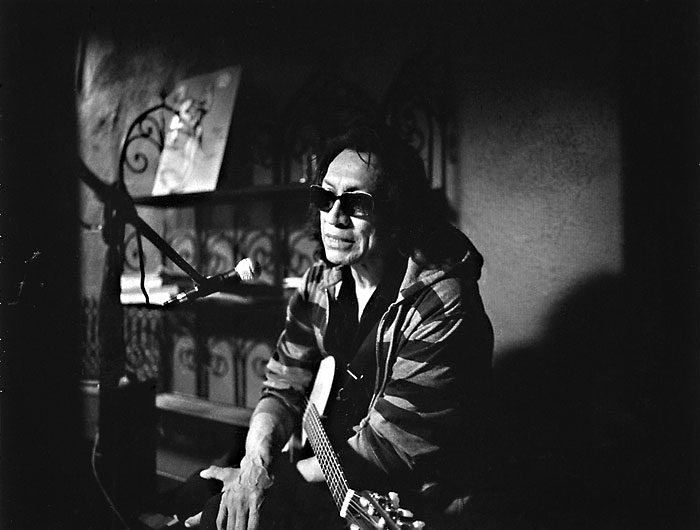When I first fell in love with writing and music in my grade-school years, my parents made a habit of sending me to arts-related camps during the summer. The best one was called “Art Burst,” and, much in line with its hippy-esque name, was mostly free-form and sensory-driven. On my first day in a creative-writing class, our instructor dismissed us into the wooded area outside simply to record everything that hit our senses for the next hour—noting whatever smells, sounds, sights, textures, or tastes we encountered without embellishing upon our findings. It’s a disarmingly effective technique for illustrative writing, and one I use frequently to this day.
It’s also an approach that Detroit-born singer-songwriter Sixto Rodriguez can undoubtedly relate to and embrace. The underground legend recorded two vividly stunning records in the early 1970s, both of which gained much of their power from his deceptively simple lyrical approach and impressive knack for finding humanity in the details. The first, 1970’s cult favorite Cold Fact, was a dark but multifaceted psych-folk record that reflected Rodriguez’s absorption of Detroit-area influences on the rise at that time, including ? and the Mysterians and the Stooges. It was also an intensely personal-sounding record that exhibited his deft touch with artful pop-song construction and his lucid insights into sexuality, love, hedonistic impulses, and left-leaning politics. For reasons that are still inexplicable, Cold Fact was a commercial failure upon its release. It fermented in obscurity for nearly four decades until Seattle-based label Light in the Attic Records reissued it last year to widespread acclaim.
In the wake of this late-blooming success, Rodriguez began playing live dates for the first time in years, performing with an eclectic selection of musicians including members of the Oblivians, the Gories, and Cold Fact‘s original producer, Dennis Coffey. Next Tuesday, June 23, at the Triple Door, he will be joined by an eight-piece band that will include a core of players from San Francisco garage-psych punks the Fresh & Onlys, noted session horn player Marc Capelle (Mark Eitzel, Jason Lytle/Grandaddy) and local horn player Galen Green, who has played with everyone from Throw Me the Statue to the Walkmen.
When I reach the man himself via cell phone, he’s riding a public bus around his native Detroit in the midst of a rainstorm, which makes for a nearly indecipherable conversation, though his wry observations are noted. “I’m on the bus headed southbound, and it’s been raining steady for a couple of hours. It’s raining cats…not quite cats and dogs,” he carefully delineates.
Our conversation turns to the stylistic and sonic distinctions between Cold Fact and his 1971 sophomore release, Coming From Reality, which LITA reissued just last month. Reading with the simplistic-yet-refined grace of a Raymond Carver short story and sounding like the Velvet Underground and Donovan having an unexpectedly fruitful meeting of the minds, Coming From Reality may not be as instantly addictive as Cold Fact, but it reveals itself slowly as a quieter masterpiece.
“A Most Disgusting Song” could be the best character study Lou Reed never got around to writing, with Rodriguez tossing off barroom observations about “local diddy bop pimps,” “bearded schoolboys with wooden eyes,” and various and sordid characters “getting pacified, ossified, and affectionate.” He partially attributes being so flush with details to his re-enrollment in college at the time. “I had worked in a factory; I got back into school late. Everyone around me was younger and full of ideas, so they influenced me a lot. I was being exposed to a lot then, and taking a lot of humanities classes.”
Aside from that darkly comic interlude, the album is achingly romantic. While lysergic touches still hover around the edges—most notably on the magic-carpet-channeling opening track, “Climb Up on My Music”—its 10 songs and three bonus tracks spill over with the starry-eyed visions of someone freshly in love. Rodriguez isn’t sharing whether this might have been the case during the record’s composition, but it’s hard to shake that assumption when he talks about the song “I Think of You.” “I wanted to write a ballad and write a song about how we all have songs that remind us of people we have relationships with,” he explains quietly. “We all have people we love, right?”








